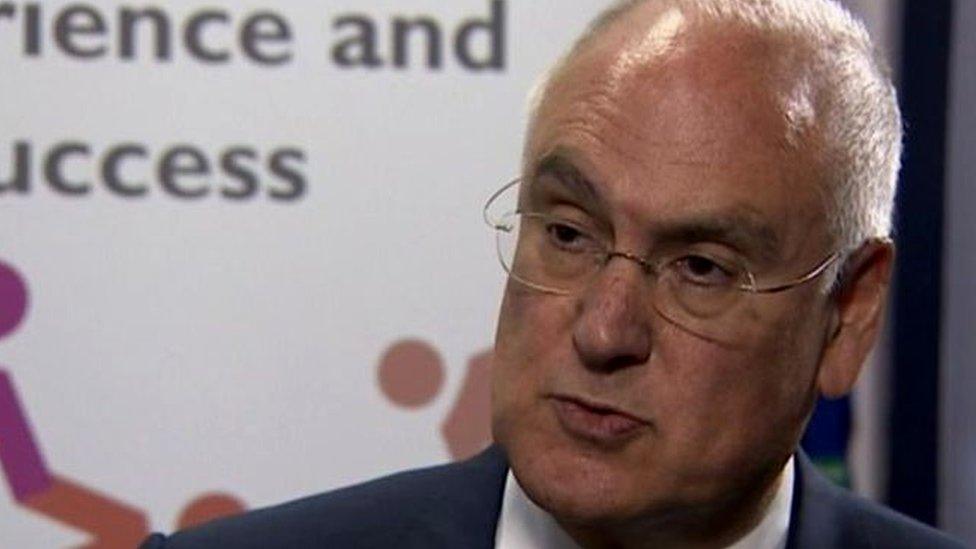Poor pupils 'are still let down', warns Ofsted boss
- Published

Poor pupils are still being let down by the English education system, Ofsted boss Sir Michael Wilshaw has warned.
In a speech on Thursday, he will highlight the "appalling injustice" of children from poorer homes continuing to fall behind their wealthier peers.
Sir Michael will call for a tougher stance on "feckless parents" who allow children to break school rules.
The Department for Education said every child, no matter what their background, deserved a world-class education.
He will also defend testing in schools, saying this offers disadvantaged pupils the prospect of a better life.
In a speech at the Festival of Education, external, taking place at Wellington College, Sir Michael will say the failure to improve the educational chances of the poor "disfigures" England's school system.
"The needle has barely moved," he will say.
"In 2005, the attainment gap between free school meal [FSM] and non-FSM pupils in secondary schools was 28 percentage points - it is still 28 percentage points now."
Sir Michael will warn of the widening gap between poorer pupils in northern England and those in the South, but he will also highlight how disadvantaged pupils in wealthy areas are being let down.
He will say: "The attainment gap between FSM and non-FSM secondary school children in West Berkshire is 31 percentage points. In Kent it's 34. In Surrey it's 36.
"In Buckinghamshire it's 39. And in Reading it's a whopping 40 percentage points - all far in excess of the national gap of 28. What an appalling injustice."
The outgoing Ofsted boss will urge schools to reject the idea that structure stifles and to stand up to "endless whines about 'petty' uniform rules", saying many poor pupils do not get much direction and support at home.
He will say: "A rule-based classroom culture helps compensate for a chaotic home life. Take it away and the poorest children rarely swim; they sink.
"Even when home structures are in place, the poor's expectations and potential are often constrained by limited cultural horizons.
"Through no fault of their own, many simply aren't aware of what is possible. Why should they be? Few of them have had access to the life-enhancing opportunities a good education brings.
"Middle-class children always have a head start. Their cultural hinterland is usually rich. Their parents are usually well educated.
"They tend to do well in school. And when they don't, their parents can always hire a tutor."
'Patronising'
Sir Michael will also beat the drum for a strong culture of testing in England's schools.
He will say: "To those who bleat about the tyranny of testing, let me say this, 'Testing isn't a burden; it's an opportunity.'
"It allows teachers to know where a child stands and what help they need. It gives the poor a passport to the prospect of a better life."
Sir Michael will say one solution is to expect more of the parents of these pupils.
"We should start by refusing to patronise the poor," he will say.
"There is nothing wrong in insisting on structure in school. We should be tough on feckless parents who allow their children to break the rules.
"I appreciate that many of them were let down by the education system. But they need to be reminded - through letters, meetings and sanctions - that the way they bring up their children has profound implications for us all."
Tackling underperformance
A spokesman for the DfE said: "Thanks to our reforms there are 1.4m more children in good or outstanding schools since 2010.
"But we know there is more we can do. The pupil premium - worth £2.5bn this year - helps disadvantaged pupils reach their potential and we have overhauled the national curriculum so all pupils have access to the world-class education they deserve.
"In our recent white paper we set out plans to tackle areas of underperformance - to ensure no child is disadvantaged just because of where they live."
Sir Michael's tenure as chief inspector comes to an end in December.
He is to be replaced by Amanda Spielman, who currently chairs exams regulator Ofqual.